In The Rise of the African Novel, Mukoma Wa Ngugi traces the way African literature has been a space to formulate and untangle African identity, writes Lebohang Mojapelo.
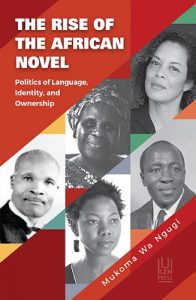
The Rise of the African Novel: Politics of Language, Identity And Ownership
Mukoma Wa Ngugi
University of KwaZulu-Natal Press, 2019
In The Rise of the African Novel, Mukoma Wa Ngugi takes on the task of tracing the African literary canon genealogically, documenting its attendant milestones and internal contradictions. From the Makerere conference and meeting of African writers writing in English, to the lost beginnings of South African writing in local languages of the early twentieth century; from the missing women of the canon, to the overlooking of Amos Tutuola’s work as an indelible moment at the beginning of African literary criticism—not only does Mukoma trace this lineage and its many supposed beginnings, but he also traces the way African literature has been a space to formulate and untangle African identity; through language, decolonisation and nationalism.
1. The Makerere moment
According to Mukoma, the effort to define what African Literature is began at the ‘African Writers of English Expression’ conference convened at Makerere University, Kampala, in 1962. The conference was attended by writers from across the continent, their goal being to ‘define, or at least agree upon, the parameters of an African literary aesthetic that would be in service of political and cultural decolonisation’. Writers in attendance were Chinua Achebe (32), Christopher Okigbo (32), Wole Soyinka (28), James Ngugi (28, later known as Ngũgĩ wa Thiong’o), Bloke Modisane (39) and Ezekiel Mpahlele (43, later known as Es’kia Mphahlele). It was also at this moment that the generational model for identifying African literature’s lineage was established, chiefly by noting Chinua Achebe as the leading forefather, owing to the praise and wide readership of Things Fall Apart. This acceptance into the wider English literary sphere, Mukoma notes, is what set the book at the forefront of the field now defined as African literature.
While this Makerere moment is notable, three distinct things were missing, according to Mukoma: African literature that had already been produced in African languages, particularly in South Africa; the ‘question of gender in terms of literary production and representation’; and the earlier work done by Nigerian writer Amos Tutuola, whose books had been acclaimed internationally before Achebe’s.
In terms of gender, Mukoma notes that when the conference is spoken of, it is rarely mentioned that there were only two women writers present at Makerere: Grace Ogot and Rebecca Njau. This point is significant: it highlights the marginalisation inherent in the effort to determine the size and scope of African literary fields. From the beginning, African women writers were excluded; and subsequently, through the works elevated by the process of canonisation, the experiences of women in relation to the nation state, decolonisation and identity were excluded. Mukoma goes on to call out his father, Ngũgĩ wa Thiong’o, for his part in this, but affords him a measure of redemption by noting how Ngũgĩ eventually recognised Ogot for having worked towards producing and promoting African literature in African languages, similar to himself.
Mukoma notes how in his father’s seminal work, Decolonising the Mind, Ngũgĩ does not discuss any African women writers, besides his co-author Micere Githae Mugo. Ogot, who wrote in Dholuo, never received the acclaim Ngũgĩ, writing in Gikuyu, did. It was only on the occasion of her death, in 2015, that Ngũgĩ finally acknowledged that ‘she was very present at the dawn of Anglophone Kenya Literature and established herself as one of the major founders and makers of the Kenya modern literary tradition’. Instead of the men at Makerere, the work of filling in the gaps in representation of women was taken up by other women writers within the African literary sphere, such as Ama Ata Aidoo, Bessie Head, Mariama Bâ, Tsitsi Dangarembga, and others.
2. Amos Tutuola, the ‘African literary bogeyman’
The question of the politics of language in The Rise of the African Novel comes out most strongly in the case of the man who Mukoma gives the title the ‘African literary bogeyman’: Amos Tutuola. Tutuola’s now-famous work The Palm-Wine Drinkard was published in 1952 by Faber & Faber in London. The book, Mukoma states, ‘reveals a poor command of English’, reflecting Tutuola’s own limited, Standard 6 education in colonial Nigeria. However, the reception of Tutuola’s work, for Mukoma, reveals ‘how questions of African aesthetics were immediately caught up in the politics of material and cultural decolonisation; but all within the web of the English metaphysical empire’. Western literary critics, Mukoma writes, saw Tutuola’s novels as ‘authentic representations of African culture, but did so often in condescending and sometimes racist terms’. While his work may have had merit to the critics, Tutuola was seen as native, tribal, and showing the limited understanding of the black African when pushed into Western-style education. His work was enjoyed in the West as a childish attempt at the novel and fed the colonial-anthropological gaze. This is perhaps why, according to Mukoma, Tutuola was not invited to the Makerere conference: his work was doing the opposite of what the attendees were trying to achieve. As a writer who had published to critical acclaim six years before Achebe, by rights Tutuola should have been there, but ‘was excluded for his use of uneducated, broken, non-university English, “vulgar” English’. His exclusion spoke to the need of the Makerere writers, who were shaping the canon and perhaps also trying to manage the colonial gaze, to maintain loftier ideals of English expression.
For Mukoma, Tutuola’s exclusion from Makerere also indicates that the shaping of an African literary discipline centred not only around English expression, but also around the political novel and the idea of ‘writing back’. It is significant that all the writers present at the conference had or were to experience political, even violent, opposition to their work, which embodied their efforts to fight oppression and imagine new nations and African identities through writing. Some, like Ngũgĩ, Modisane and Mphahlele, experienced imprisonment and exile. In the same light, Achebe very clearly noted that his books did the work of ‘writing back’ to the colony, to the received ideas about the African, showing that Africans too had a history to be proud of and could articulate themselves—contrary to portrayals in novels such as Conrad’s Heart of Darkness. These motivations, combined with a focus on the political novel, as well as an emphasis on ‘writing back’, marginalised Tutuola in a way that did a disservice to his legacy.
3. A forgotten beginning and three stages of African letters
In a chapter titled ‘Africa’s missing literary history’, Mukoma notes that ‘long before Achebe and his generation of African writers, there was an established literature originally in English, or in African languages and then translated into English, in South Africa’. These included writers like Thomas Mofolo, who wrote the first novel in Sesotho, Moeti oa Bochabela, in 1907 (and who later we knew for his epic, Chaka); RRR Dhlomo, who published An African Tragedy in 1928; Samuel Mqhayi, whose Ityala Lamawele was published in 1912; and AC Jordan, whose Ingqumbo yeminyanya (1940), was translated into English as The Wrath of the Ancestors in 1964. But these early South African writings were not considered fitting for the canon. Writing in African languages was considered more orature than literature, or as a step after orature and before the writing of what was considered real literature. Mukoma notes the contradictions inherent in this idea, as the works of the architects of the canon, Achebe and Ngũgĩ, are considered to heavily rely on orality as an aesthetic device.
For Mukoma, a reading of early South African writing reveals valuable insights into the progression of African literature, especially in relation to identity and the work of following decades, across the continent. He discerns three clear stages of literature in his book, the first being the concern with cultural ‘synthesis’ that early South African writing takes up, specifically in The Wrath of the Ancestors, where:
‘[…] the coming of the European has not yet bloomed into an irreconcilable apartheid. At the same time, African cultures are not only confidently alive but are also resisting. The answer for these writers becomes synthesis—not just co-existence but strategic borrowing and melding.’
In the second stage, the novels that emerge from the Makerere generation address how to live within colonial boundaries, where ‘synthesis is no longer possible and decolonisation becomes the answer, but it is one full of contradictions as they usher in economic, political and aesthetic neocolonialism’. Last, in the post-Makerere novel, there is the stage of the betrayal of African nationalism. As Mukoma demonstrates through NoViolet Bulawayo’s 2013 novel, We Need New Names, the contradictions of decolonisation are incredibly more painful in the light of African governments who have not lived up to the aspirations imagined by the Makerere generation, and never even foreseen by the early South African writers.
While all three stages deal with whiteness, colonialism, language, gender and identity, in his comparison of the three realist novels representing each period, Jordan’s The Wrath of the Ancestors, Achebe’s No Longer at Ease (1960) and Bulawayo’s We Need New Names, Mukoma notes the significant opening up of genre, right up to the present time, where Bulawayo’s work represents a moving away from the linear model of storytelling to more complicated, experimental forms. Thess new forms reflect a globalised world and a renewed search for the meaning of what an African novel—and who an African writer—is today. As Mukoma states:
‘If the colonial world could be contained in the linear but flashback-employing novel, the globalised world today calls for different narrative strategies—diaries, blogs, fragments, digressions—all in one novel’.
4. Language and the contemporary African writer
Perhaps the most significant subject in African literature, one that still prevails today, is that of language. While some argued that a language imposed by conquest could not be used for a national literature, Mukoma writes that the Makerere generation of African writers:
‘argued that English was an international language of power and it was in Africa to stay—it was only pragmatic to use it. […] These writers also believed that English could be Africanised to carry an African experience, and that ultimately the language the author chooses to use is a personal choice with no social and culture ramifications.’
With the canon having been deliberately set in English and other colonial languages, the question of identity remains. Every few years the requirements are challenged. Recently, for example, Taiye Selasi commented that African literature doesn’t exist—that in a globalised world where transnational writing is taking place the term is outdated and more limiting than descriptive. Previously, theorists such as Kwame Anthony Appiah have played around with the idea of Afropolitanism to describe a new kind of African who doesn’t necessarily belong to one place on the continent. And as African writers hold complex relationships with their locations, belonging and occupations of space, African writing becomes similarly complex. These contradictions are not only a challenge for African writers but for critics as well.
Mukoma quotes Biodun Jeyifo, who ‘cautions against a dichotomisation or binary […] in African literary criticism where African literature belongs to Africans and literary criticism to Western critics’. This rings especially true when it comes to how African literature has consistently been centred around the ideas and standards of Western critics. The erasure of the early South African writers from the canon was significant because their work was not in English and therefore not discernable as, for example, ‘a novel’, as determined by a colonial understanding of orature and African languages as ‘lesser’ or unsophisticated. The marginalisation of Tutuola’s work was also due to his reception as an untutored native who was trying but failing, and therefore detrimental to the ends of the Makerere generation. To compound this, Mukoma goes further, highlighting the critical reception of We Need New Names and noting once again the return to the anthropological gaze that the book was subject to. The portions of the novel located in Zimbabwe were considered ‘well written’, but not so the American sections, which did not reflect what reviewers considered to be a universal immigrant experience. In this light, We Need New Names highlights a schism inherent within literary criticism that blocks African literature from determining itself as a field. As Mukoma writes,
‘Universalising the African experience in the West ignores the complex historical and changing questions on the geography and identity of African literature and literary criticism.’
Mukoma concludes with the notion that the African literary tradition is one that ‘exists as a question and debate—one on the move with debates around identity, language, and politics swirling around it’. For Mukoma, there is a need for the African novel to be released, in form, in location and in relationship, to other literatures. But most importantly, echoing the nameless narrator in Nuruddin Farah’s Maps, African literature should be free to remain ‘a question to itself’.
- Lebohang Mojapelo is an editor, writer, researcher and poet based in Johannesburg. Follow her on Twitter.

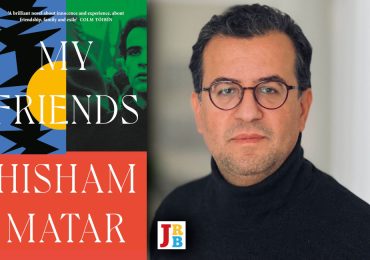
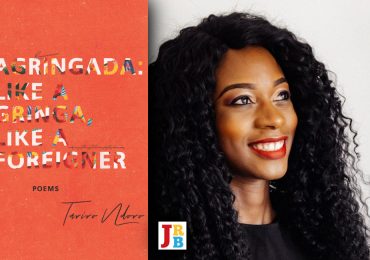
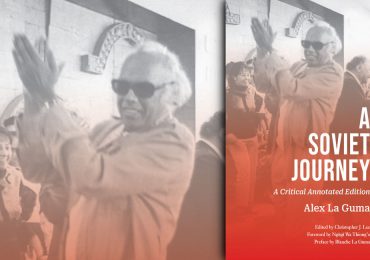
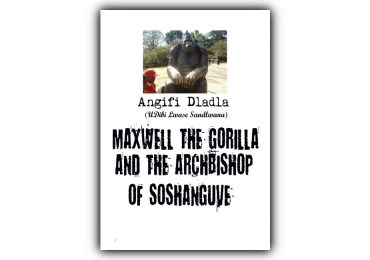

I was introduced to Amos Tutuola’s work in 2019. The language was ‘awful’, if you will, but the story and the ‘awfulness’ of his language makes his work a delight. Tutuola’s work was part of the many works we had to read for our MA degrees in Creative Writing at Rhodes. In a way, I was captured by Tutuola’s ‘broken’ grammar. I remember thinking: us writers we’ve got ‘superior’ grammar, but we can’t make it sing like Tutuola does.
While I liked Tutuola’s work, my thesis (which I wanted to title My African Novel) chose not to follow in Tutuola’s footsteps. I mean, to try and imitate Tutuola will just show you how uncreative you are, even though you might be in posession of ‘superior’ grammar. My conclusion? Well, here’s one thing: reading Tutuola will probably make you follow ths works of Chief Fagunwa, West African literature, if I’ve got my geography right. Reading Tutuola and Fagunwa will just show us of how little of African literature we’ve read. In that case, it also becomes quite shallow to try and define what an African novel is, but kudos to those who tried. They didnt wait for Tutuola and female writers to have their conferences. In other words, they didn’t leave us with definite descriptions of what an African novel is, leaving the door open for anyone who wants in on the discussion.